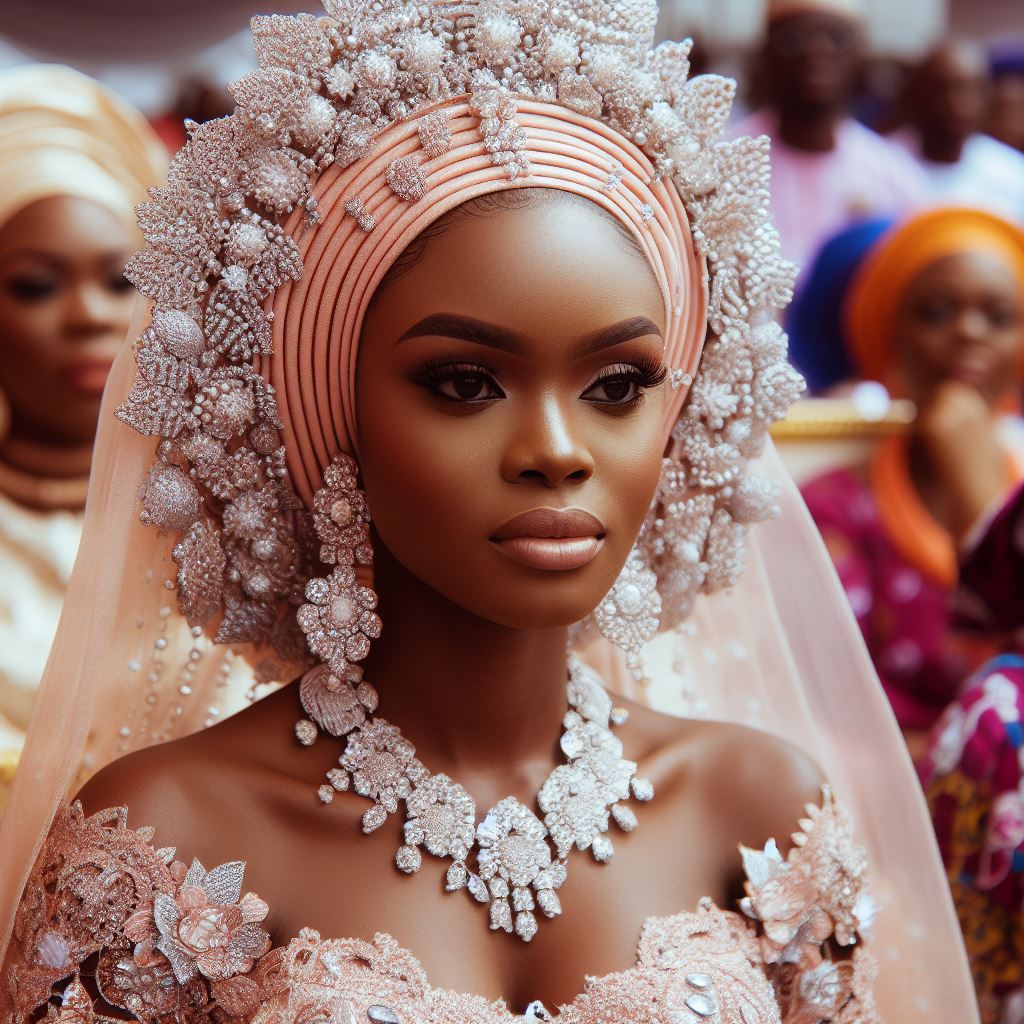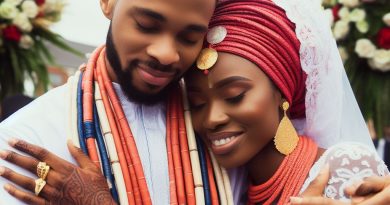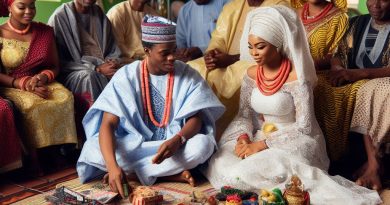Behind the Veil: Untold Stories of Nigerian Brides
Last Updated on January 28, 2024
Introduction
Hook: Nigerian brides, often glamorized, mask untold struggles and emotions beneath their smiles.
Brief glimpse into diverse Nigerian marriage customs, showcasing cultural richness and traditions.
Thesis statement: This blog post peels back the layers, revealing the concealed trials and triumphs of Nigerian brides.
In this section, we’ll venture behind the scenes, delving into the intricate lives of Nigerian brides.
Beyond the sparkling attire and joyous celebrations lie profound narratives of resilience and transformation.
Stay tuned as we unravel the unspoken challenges and victories, giving voice to the silent stories of these extraordinary women.
Traditional Expectations
Cultural pressures on Nigerian brides to conform to societal expectations
- The Nigerian society places significant pressure on brides to conform to traditional cultural norms.
- Brides are expected to adhere to strict guidelines regarding their behavior, appearance, and role within the family.
- These expectations are deeply rooted in the cultural heritage and are enforced by family members and society at large.
- Failure to meet these expectations can lead to social ostracism and, in extreme cases, even violence.
- As a result, Nigerian brides often find themselves trapped between their desire for individual freedom and societal conformity.
Importance of maintaining family reputation and honor
- In Nigerian culture, family reputation and honor are of utmost importance.
- It is believed that a bride’s behavior reflects directly on her family’s reputation.
- Therefore, brides are expected to uphold the family’s honor through their actions and choices.
- Any deviation from societal expectations can be viewed as a disgrace to the family and tarnish its reputation.
- Thus, Nigerian brides face immense pressure to conform to traditional values and expectations.
Limited autonomy and decision-making power for the bride
- Nigerian brides often have limited autonomy and decision-making power in their own lives.
- Major decisions, such as the choice of a partner or even the date of the wedding, are often made by the family.
- The bride’s desires and preferences are secondary to societal and familial expectations.
- This lack of autonomy can lead to feelings of helplessness and frustration among Nigerian brides.
- It also reinforces the notion that the bride’s primary role is to please her family and adhere to cultural norms.
In general, Nigerian brides face immense pressure to conform to traditional expectations due to cultural pressures, the importance of maintaining family reputation, and limited autonomy.
These expectations can significantly impact a bride’s individual freedom and decision-making power.
It is crucial to recognize and address these societal expectations to foster a more inclusive and empowering environment for Nigerian brides.
Read: The Influence of Nollywood on Marriage Messages in Nigeria
Financial Burdens
The high cost of traditional Nigerian weddings
- Nigerian weddings are known for their extravagance and the high costs associated with them.
- Traditional Nigerian weddings often involve elaborate ceremonies and multiple costly cultural practices.
- Expenses can include the purchase of expensive fabrics, jewelleries, and other traditional attire.
- Additionally, hiring professional photographers, traditional dancers, and musicians adds to the overall expense.
- These lavish weddings contribute to the financial burden placed on Nigerian brides and their families.
- Many families feel pressured to conform to societal expectations, even if it means going into debt.
Expectation for the bride’s family to bear most wedding expenses
- In Nigerian culture, it is customary for the bride’s family to bear the majority of the wedding expenses.
- Traditionally, the bride’s family is responsible for organizing and funding the entire wedding ceremony.
- This expectation places a significant financial burden on the bride’s family, often leading to financial strain.
- The pressure to meet societal expectations and provide a lavish wedding can be overwhelming.
- As a result, families may have to deplete their savings, take out loans, or seek financial assistance.
Impact on the bride’s family financial stability and well-being
- The financial burden of hosting a traditional Nigerian wedding can have long-lasting consequences.
- Many families experience a decline in their financial stability and overall well-being as a result.
- They may struggle to recover financially even after the wedding is over.
- Some families find themselves in debt and face difficulties in meeting their basic needs.
- It can hinder the bride’s family from pursuing other important goals and investments.
- The stress and pressure associated with bearing excessive wedding expenses can take a toll on their mental and emotional well-being.
In conclusion, traditional Nigerian weddings come with a significant financial burden for the bride’s family.
The high costs associated with these weddings and the expectation for the bride’s family to bear most of the expenses can have a detrimental impact on their financial stability and well-being.
Many families feel pressured to conform to societal expectations, often leading them into debt or financial strain.
It is important to recognize these financial burdens and consider alternative ways to celebrate weddings that are more sustainable and affordable.
Read: Marriage Messages in Nigerian Literature: A Deep Dive
Gender Roles and Household Dynamics
Gender roles and household dynamics play a significant role in the lives of Nigerian brides.
Societal expectations, traditional gender roles, and personal ambitions often collide, creating challenges and complexities in their lives.
Prevalent Gender Stereotypes and Expectations Placed on Nigerian Brides
In Nigerian society, there are prevalent gender stereotypes and unrealistic expectations placed on brides.
These stereotypes often revolve around the idea that women should primarily focus on marriage and motherhood, rather than pursuing their own ambitions and careers.
From an early age, Nigerian girls are socialized to believe that their main purpose in life is to become a wife and mother.
They are brought up to believe that their worth lies in their ability to fulfill these traditional gender roles.
This societal pressure can be overwhelming for Nigerian brides, as they often face public scrutiny and judgment if they deviate from these expectations.
Furthermore, there is a notion that brides should be submissive, obedient, and prioritize their husbands and in-laws’ needs above their own.
This places immense pressure on Nigerian brides to conform to societal expectations, even if it hinders their personal growth and ambitions.
Traditional Gender Roles and Division of Labor within Nigerian Households
In Nigerian households, traditional gender roles and the division of labor are deeply ingrained.
Men are typically seen as the providers and decision-makers, while women are expected to take care of the home and children.
Within these traditional gender roles, Nigerian brides often find themselves burdened with the majority of household chores and responsibilities.
They are expected to cook, clean, and take care of the children, often without the necessary support from their husbands or extended family.
This division of labor often restricts Nigerian brides from pursuing their own ambitions and careers.
They have limited time, energy, and resources to devote to their personal growth and professional development.
Challenges Faced by Brides in Balancing Societal Expectations and Personal Ambitions
The challenges faced by Nigerian brides in balancing societal expectations and personal ambitions are substantial.
They often find themselves torn between fulfilling traditional gender roles and pursuing their own dreams.
The pressure to conform to societal expectations often leaves Nigerian brides feeling trapped and unfulfilled.
They may have personal aspirations for education, career advancement, or entrepreneurial endeavors, but feel constrained by the expectations placed upon them.
Furthermore, the lack of support from their spouses and families can further compound these challenges.
Nigerian brides often struggle to find a balance between meeting societal expectations and striving for personal fulfillment.
However, there is hope for change.
As Nigerian society evolves, more Nigerian brides are challenging traditional gender roles and societal expectations.
They are advocating for gender equality, empowering themselves through education and economic independence, and redefining what it means to be a Nigerian bride.
In conclusion, gender roles and household dynamics significantly impact the lives of Nigerian brides.
Prevalent gender stereotypes and expectations, traditional division of labor, and the challenges of balancing societal expectations with personal ambitions create a complex environment for Nigerian brides.
While the road may be challenging, Nigerian brides are slowly breaking free from societal constraints and carving their own paths towards empowerment and fulfillment.
Read: Factors to Consider When Insuring Your Marriage Ring in Nigeria

Parental Influence and Pressure
The role of parents in arranging marriages or influencing the choice of partner
- Parents often play a central role in arranging marriages for Nigerian brides.
- They believe it is their responsibility to find a suitable spouse for their children.
- Parents consider factors such as social status, financial stability, and family background when selecting a partner.
- The opinion and approval of parents hold significant weight in the final decision-making process.
- This practice has deep cultural roots and is seen as a way to preserve tradition and strengthen family ties.
Pressure to prioritize parental wishes over personal desires
- Nigerian brides often face immense pressure to prioritize their parents’ wishes over their own personal desires.
- The expectation to obey and respect their parents can be overwhelming.
- Many brides feel a sense of duty to honor their family’s wishes, even if it means sacrificing their happiness.
- This pressure can lead to internal conflicts and feelings of resentment towards their parents.
- Fear of disappointing their parents can influence decision-making and limit autonomy in choosing a partner.
Emotional implications for the bride and its impact on marital satisfaction
- The emotional implications of succumbing to parental pressure can be significant for Nigerian brides.
- They may experience a sense of loss of personal agency and autonomy.
- Brides may feel a lack of control over their own lives and decisions.
- This can lead to feelings of frustration, dissatisfaction, and resentment within the marriage.
- The impact of parental pressure on marital satisfaction can strain the relationship and hinder communication.
Infact, parental influence and pressure play a crucial role in the lives of Nigerian brides.
The arrangement of marriages and the expectation to prioritize parental wishes over personal desires can have emotional implications on the brides.
It is important to strike a balance between cultural traditions and individual happiness to ensure long-term marital satisfaction.
Open communication and understanding between parents and brides are essential in navigating these challenges and creating harmonious relationships.
Read: Eco-Friendly Marriage Rings: A Growing Trend in Nigeria?
Gain More Insights: Cross-Cultural Marriages: Securing a Certificate in Nigeria
Bride Price and Dowry
Bride price and dowry customs in Nigerian marriages
- In Nigerian marriages, bride price refers to the payment made by the groom or his family to the bride’s family.
- It is a long-standing cultural tradition that symbolizes the groom’s ability to care for his future wife.
- Dowry, on the other hand, is a gift given by the bride’s family to the groom or his family.
- It often includes items like money, property, or valuable goods.
- These customs aim to strengthen the bond between families and ensure financial security for the bride.
Potential exploitation or commodification of brides due to these practices
- However, these customs can sometimes lead to the exploitation and commodification of brides.
- In certain cases, families treat bride price as a source of income and demand exorbitant amounts.
- Some families even use it as an opportunity to seek financial gain, disregarding the well-being of their daughter.
- Such practices can objectify women and reduce them to mere economic transactions, undermining their autonomy.
- It is crucial to address this issue and ensure that bride price and dowry are exchanged without exploiting women.
Emotional toll and potential strain on the relationship between the bride and groom
- The customs of bride price and dowry can also have emotional ramifications for the bride and groom.
- For the bride, it may create a sense of obligation or indebtedness towards her husband.
- She might constantly feel the need to prove her worth and value, affecting her self-esteem and confidence.
- Furthermore, the groom may face societal pressure to meet the expectations set by the bride’s family.
- This pressure and financial burden can strain the relationship and lead to resentment or dissatisfaction.
While bride price and dowry hold significant cultural value in Nigerian marriages, it is essential to address the potential exploitation and emotional toll associated with these practices.
They should be carried out with mutual respect, ensuring the well-being and autonomy of brides, and promoting healthy relationships between couples.
Explore Further: Hausa Marriage Rites: Beyond The Vow Exchange
Unrealistic Beauty Standards
Societal pressures on Nigerian brides to meet unrealistic beauty ideals
Society imposes unrealistic beauty standards on Nigerian brides, creating immense pressure to conform.
Influence of media and societal expectations on self-esteem and body image
The media and societal expectations heavily influence Nigerian brides’ self-esteem and body image.
Constant exposure to glamorous images leads brides to compare themselves, fostering insecurities.
Psychological and emotional impact on brides
The pursuit of unrealistic beauty standards takes a toll on Nigerian brides’ psychological and emotional well-being.
Feelings of inadequacy, self-doubt, and dissatisfaction often arise due to unattainable beauty goals.
Brides may develop body dysmorphia and experience anxiety or depression, detrimentally affecting their mental health.
Conclusion
Recap of the hidden challenges faced by Nigerian brides
In this chapter, we have delved into the untold stories of Nigerian brides, shedding light on the hidden challenges they face.
From the pressure to conform to societal expectations to the financial burdens placed upon them, these brides navigate a complex web of obstacles.
Call to action for raising awareness and promoting open discussions about these issues
It is essential that we rally together to raise awareness about these challenges and initiate open discussions.
By breaking the silence, we can empower Nigerian brides and give them a platform to voice their experiences, concerns, and aspirations.
Emphasis on the need for societal change and support for Nigerian brides
The plight of Nigerian brides underscores the urgent need for societal change.
We must challenge traditional norms, debunk harmful stereotypes, and cultivate an environment that supports these women as they embark on their life journeys.
Let us stand beside them and provide the necessary support they deserve.
In conclusion, Nigerian brides have long carried the burden of these hidden challenges.
It is up to us to amplify their voices, shed light on their experiences, and work towards a more inclusive and supportive society.
Only by joining forces can we create lasting change for Nigerian brides and ensure a brighter future for all.


